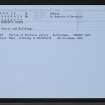Pricing Change
New pricing for orders of material from this site will come into place shortly. Charges for supply of digital images, digitisation on demand, prints and licensing will be altered.
Hurnip's Point
Building(S) (Period Unassigned), Naust(S) (Period Unassigned), Unidentified Pottery (Neolithic)
Site Name Hurnip's Point
Classification Building(S) (Period Unassigned), Naust(S) (Period Unassigned), Unidentified Pottery (Neolithic)
Alternative Name(s) Mirkady
Canmore ID 2990
Site Number HY50NW 30
NGR HY 5446 0634
NGR Description HY 5446 0634 and HY 5448 0635
Datum OSGB36 - NGR
Permalink http://canmore.org.uk/site/2990
- Council Orkney Islands
- Parish St Andrews And Deerness
- Former Region Orkney Islands Area
- Former District Orkney
- Former County Orkney
HY50NW 30 5446 0634 to 5448 0635
Against the W end of a sharp natural rise on the S-facing shoreline E of Hurnip's Point, there are two large and ancient-looking naust-tofts. The E one is partly cut into the side of the hillock and is 9m long and 5m wide; the other, not quite parallel with it and 3m to the W, measures 8m by 6m. The mouths of both are truncated by erosion and hang 1m above the beach, which is an even foreshore of shingle leading down to a smooth wave-cut platform.
K A Steedman 1980; RCAHMS, visited April 1986
Two adjacent, damaged boat nausts, 7-9m in surviving length. Detailed hachure plans of these nausts were produced in July 1991 and subsequently the southern naust was totally excavated and a section cut across the naust to the N. This showed that the nasuts were not simple scooped hollows revetted with stone, but were formal structures. The southern naust might most accurately be described as a dry dock. Dating evidence suggests that the latest use was post-medieval, though its stone constructional matrix, almost certainly quarried from HY50NW 58, (q.v.) included a sherd of neolithic pottery.
J R Hunter 1991.








